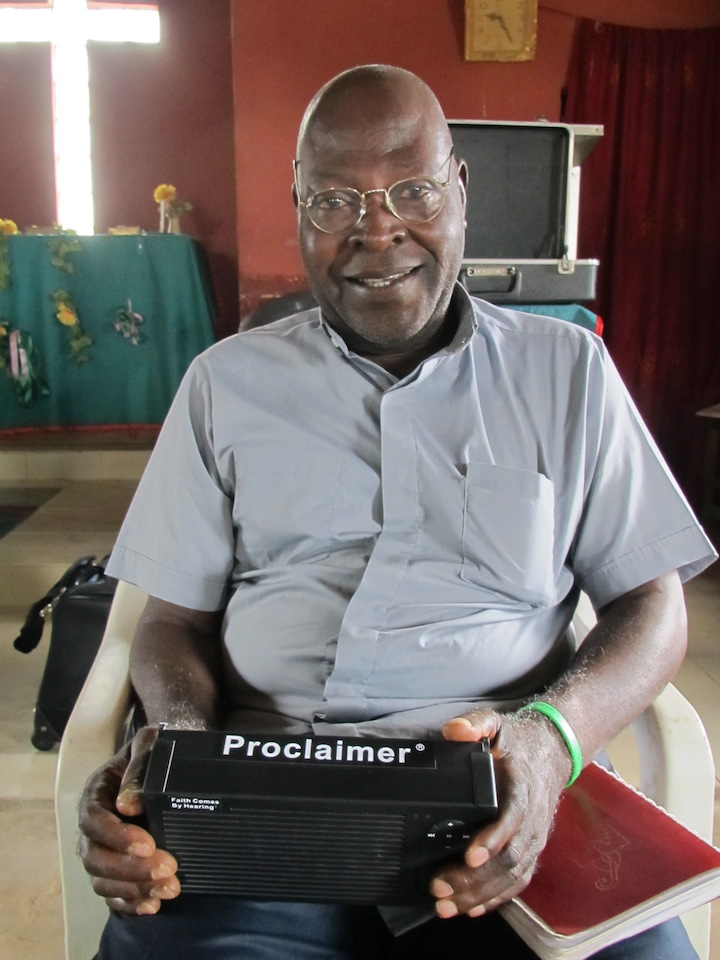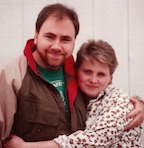Nigeria
by Doug Weiser
[ In October Missionary Weiser’s work in Nigeria will be transferred to new Missionary Jeff Heitsch, who will make regular visits to Nigeria while living in Cameroon and working in partnership with Missionary Dan Kroll there. ]
What other churches do:

Nigeria president Rev. Mathias Odey
(now retired) holds a Proclaimer
Many churches make big use of TV and radio broadcasts. Too costly for our churches. WELS not in position to underwrite those sort of costs. Many churches use Facebook and other social media. Our synods do not work at that. And the sorts of young people they have who could work on social media might not be worthy representing their synods.
Current situation and limitations: Christ the King and All Saints Lutheran Church(es) of Nigeria (our 2 sister synods):
- Cell phones: most everyone has a mobile phone or two. Old technology. Reception very spotty out of cell tower range in the cities.
- Smart phones: very few of our pastors have smart phones. Almost none. Their matured children are more likely to have smart phones, but only if they have landed some sort of paying job. That’s also rare.
- TV screens: most TVs are old technology and lack USB ports.
- Online access: unless in presence of a buried cable (which very few are) online access is available only through cell phone service such as MTN or Airtel, etc. This requires a smart phone and an mobile account supported by fees paid. In addition, there must be mobile phone reception in order to get the smart phone online. (e.g. a hotel we use in Ogoja is at too low an elevation to get phone service. We must walk up the hill to get service.)
- Electricity: for charging phones, etc. Grid electricity almost non-existent outside the cities. And cities beyond the important ones like Lagos and Abuja, seldom have grid power. So most everyone depends on charging up with a wire outlet from someone’s generator. The lack of power makes use of powered or battery technology such as TVs or projectors nearly useless. If battery powered, those must be charged at some point. At this time, our pastors have a hard time keeping their old tech mobiles charged.
- Solar power: none of our pastors has this. But it would be an answer to their electricity needs at least for their technology.
What do we have for technology?
- Classroom equipment: At our seminary and pre-seminaries we have daylight and blackboards. Our schools don’t have copiers. They are equipped with generators for lights and charging about three hours per evening. They can use smaller generators during the day for electronics. But this requires money for fuel.
- Printed texts: we provide some printed material for our students. Pro: texts don’t need electric power. Con: Books with good theological material are not available for purchase in Nigeria. Reliable shipment of books from USA far too costly, requiring visitors to carry books in extra suitcases. Moist weather and roof failures ruin many of the books owned by pastors.
- Proclaimers: WELS donors have supplied all of our pastors and pre-seminary students with 220v/battery/solar charger Proclaimers for playing recorded Scripture to groups. I don’t know the record of how much these are used for the proclamation purposes. Pro: can play audio content to medium large audiences. Can receive new SD cards. Can charge by solar rather than electric power. Con: no video content. Content hard to search for and find.
- Tablets: WELS donors have supplied all pastors and all pre-seminary students with electronic tablets. Prof. Tom Kuster and friends at Bethany have supplied microSD memory cards containing school texts, Book of Concord, and many other titles. Pro: we can provide students and pastors with high number of confessional Lutheran titles to read on their tablets without carrying hundreds of pounds of books in suitcases. This is much cheaper than buying and carrying books. These books are transferable from their tablets to others using Bluetooth technology. Con: Tablets depend on poor electric power supplies to be recharged. tablets contents cannot be shared with audiences without link up to some sort of projector and sound system. Tablets spoil in some way and we have not gone back to the providers to replace them. To date we the WELS has not obligated itself to replace worn out and failed tablets, since that would never have an end date.
- Laptops: WELS has supplied a limited number of synod leaders with donated/used laptops. We have supplied two laptops to each pre-seminary so they can introduce the students to computer use. Pro: enables leaders and students to write and keep records digitally. Full size keyboard makes composing easier. Content meant for printing can be transferred by USB flash drive. These can share audio/visual content with small audiences. Con: laptops degenerate quickly in Nigeria’s moist climate. Used laptops fail more quickly. They depend on electric power to recharge. Batteries tend to fail in the climate.
- Public access points: Nigerian cities and larger towns offer cyber cafes, copy shops, limited brands of computers and peripherals, even book publisher/printers, radio and TV studios, music studios, etc. for a price. This requires someone in the USA willing to pay, since our Nigerian synods lack the funds.
- Missionary connectivity by phone: new (Nigeria & Cameroon) Missionary Jeff Heitsch and his wife are with Dan and Karen Kroll in Cameroon right now. In late October they should be driving up to Bamenda, Cameroon, to occupy their rental home. Jeff got an MTN line and SIM card for his smart phone in Cameroon. Unfortunately, while he can receive SMS text messages, he can’t send texts to the States. But he can send me texts on WhatsApp.
- Missionary connectivity by internet: Jeff has been able to connect via internet in Cameroon. My guess is that its through his mobile phone service. So we can exchange email and he is able to post to their blog.
Cameroon
by Dan Kroll
I'm learning that we are struggling badly with technology. Even the BlueTooth work you had put together is not going as I had hoped because very few people have the memory for it on their phone. I did talk to our Bible Institute students who again commented that so few people have memory on their phones to download even the Bible, that this just isn't practical at this point in time for Cameroon.
Also wanted you to know that we appreciate the work you do there and do plan to be involved in the future. Please, let's keep in touch.
Return to original language with "show original" button at top left.






Discussion
Actually, that makes me think a bit about diffusion of innovations. Since we know that many countries occupy curves that are offset from other parts of the world, we can predict adoption rates in those countries and time our presentation of materials to best coincide with their adoption. Does anyone know if there are any resources out there that can provide insight into the general tech level available to the population of a given country?
Our Nigerian pastors all have mobile phones, but not the smart phone type. Just a couple have smart phones. Most phones are Android type. All have or had tablets too. I could share only donated laptops like Thinkpads. New technology is widely available, but at a price our pastors and supporting mission agency can't afford. We also run into the wall of repair or replacement. The sending mission just dare not be responsible for our the national church's technology forever.
The most accurate prediction about technology curve could be the national level of electric power generation. Without a functioning power grid, battery driven technology will be hopelessly crippled.